

Discover more from Fast Women
Fast Women: Liza Corso thrives at Lipscomb
She was part of the cross country team that finished 11th at NCAAs.
Issue 271, sponsored by Bakline
I accidentally sent out this newsletter early once in 2023, but this time I’m sending it out a little early intentionally, in case reading it on Sunday is easier than Monday for some of you. I’ll go back to Monday at 5:00 a.m. ET next week.
Liza Corso of Lipscomb Seeks Second Paralympic Berth
Liza Corso had her first taste of international competition the summer after she graduated from high school. She went into the T13 1500m final at the 2021 Paralympic Games in Tokyo ranked eighth, not expecting to be in medal contention. But Corso had the race of her life, shaving 13 seconds off her personal best and earning a silver medal in 4:30.67.
Now a junior at Lipscomb University, Corso, 20, has continued to make big performance leaps. Last spring, she ran 2:07.83 for 800m, 4:19.54 in the 1500m, and 16:22.95 in the 5,000m. And in the fall, she helped Lipscomb earn a surprise 11th-place finish at the NCAA Cross Country Championships, after the team went in ranked 25th. Corso finished 138th, running 20:56 for 6K, and was Lipscomb’s sixth runner.
Corso has had an impressive collegiate career so far, but it’s all the more so when you consider that she was born with oculocutaneous albinism (OCA), which makes her legally blind and affects her depth perception. She has low pigment in her hair, skin, and eyes, which causes her to be very sensitive to the sun. She races wearing a hat, trains wearing sunglasses, and makes sure to wear sunscreen.
In the T13 division at Para competitions, Corso races other athletes with visual impairments. In August, she earned another silver medal in the T13 1500m, at the world championships in Paris. This summer, she hopes to make a return trip to the Paralympics, which are also in Paris.
Growing up in Newmarket, New Hampshire, Corso wasn’t aware of the Paralympics until her sophomore year of high school at Portsmouth Christian Academy. She doesn’t normally race with a guide, but that year, her cross country league championship had moved to a new location. She expected to be up front and was worried about getting lost, because she didn’t know the course. So her coach, Mike Shevenell, recruited two older male runners to serve in the same role as a lead vehicle would.
She won the race, and it made the local news. Someone who worked for the U.S. Association of Blind Athletes saw it and reached out and told her about the Paralympics and invited her to a camp. At first, she was hesitant.
“Running was a place where my vision affected me, but I could kind of hide it and just run like everyone else,” Corso told Fast Women. “Doing the Paralympics, it was something where my vision was now in the spotlight.”
Sports were a part of Corso’s childhood. She swam, skied, played basketball, and even did gymnastics. “My parents definitely didn’t hold me back based on my vision,” she said. “They were like, ‘You want to try this? Go for it.’ Looking back, oh my gosh, I don’t have depth perception. How did I walk on a balance beam or run into a vault? But it was just the mindset of just try it, just go for it.”
The activity she was most focused on during middle school, though, was competitive jump rope. She and her teammates would compete and perform around the country. She credits speed jump rope, where competitors did as many jumps as possible during a set amount of time, for building the speed and endurance she needed to be a good runner. Corso ran her first 5K at age five and joined her elementary school’s cross country team in fourth grade. But she didn’t start to get more serious about running until she got to high school.
Lipscomb coach Nick Polk started coaching Corso leading into the 2021 Paralympic Games, and she thinks the gradual mileage increase and tougher and more targeted workouts contributed to her breakthrough and silver medal. Her momentum slowed slightly during her first year of college, when she developed a stress reaction in her shin during the indoor season, but since healing, she has been on an upward trajectory.
Corso also credits her teammates and Lipscomb’s positive team culture. “We’re able to work really hard in practice and in races, but we’re doing it for each other, and we’re really supportive of each other, instead of getting competitive that way,” she said. “And I think all having the same goal of glorifying God through racing and training has been really cool, too.”
Corso is double majoring in psychology and nutrition and minoring in exercise science. It’s helpful when her professors post their powerpoints or tests online, so she can zoom in on her screen. She takes notes on an iPad, using an Apple pencil, because sometimes it’s hard for her to see her own handwriting. If she’s in a restaurant and can’t see a menu, or if she’s unable to read a sign, she will take a photo with her phone and zoom in on it. “I use tools that many people have access to,” she said. “I just use them in a different way.”
Her teammates are always happy to help her out, giving her rides to practice because she can’t drive, or reading off splits during workouts. Corso can read about size 20 font, so she can read the numbers on her watch, but it’s more challenging when the sun’s out and there’s a glare.
Cross country races with crowded fields can be challenging, too. But Corso points out that staying on one’s feet can be tough for everyone. She found the steep downhills at NCAAs, hosted by the University of Virginia, to be particularly tough because of her lack of depth perception.
When she runs track races with a waterfall start, Corso sometimes has trouble seeing the break line or the cone that marks where the athletes on the outside need to cut in. So when possible, she’ll have a coach stand at that spot and give her the vocal cue.
She has gradually worked her way up to 60–65 miles per week, compared to the 25–35 she ran during high school. This year, keeping the Paralympics in mind, which will take place at the end of August, she and Polk will be more cautious about not overdoing her training and racing early in the NCAA season.
The Paralympic Track & Field Trials will take place July 18–21 in Chula Vista, California. In order to make the team, Corso will have to place well in the 1500m and run a fast time. If she continues to run the way she’s been running, it shouldn’t be a problem. At last summer’s world championships, she finished only 0.35 seconds behind the winner, Fatima Ezzahra El Idrissi of Morocco. Assuming Corso earns a return trip to Paris, she’s hoping for gold this time out.
Corso used to try to hide her visual impairment, but participating in the Paralympics and hearing other athletes’ incredible stories emboldened Corso to share hers. She wants to show other people with disabilities or visual impairment that it’s not something to hide; it’s just a part of them. Her advice? “Don’t let anyone hold you back from accomplishing what you want to accomplish,” she said. “Everyone has challenges in their life—some may be seen, some may be unseen—but we are all able to work through them.”
Thanks to Bakline for sponsoring Fast Women this week
Bakline champions the ‘Fast’ mindset, beyond the time on the watch. We’re committed to athletes at all levels, from Olympic aspirants to local skills-focused racers. This ethos fuels our product development, coaching, and community initiatives.
Fast Women Subscribers get 20% off this week with the code fastwomen, including our Cold Weather collection and new Women’s Shorts with tons of pockets! At the start of the 2024, this returns to its normal 15%
While many of you know us for our performance gear, Bakline also offers run coaching services from 100 meters to 100 miles. The first three members of the Fast Women community to email coach@bakline.com will receive dedicated coaching for their next race. Our co-coaching philosophy is simple: There are no secrets or shortcuts. Our methods are deeply informed by science, research, and experience. So be fast and shoot us an email!
Happy Holidays and thank you for following us!
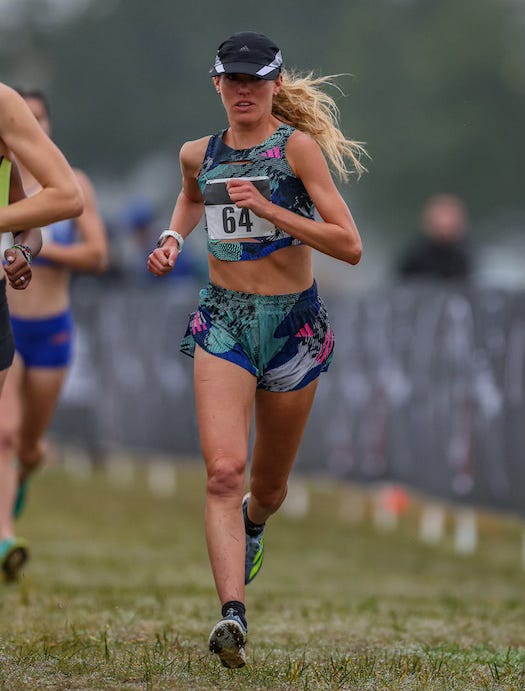
Results Highlights
After finishing second at the Sound Running Cross Champs and third at Venta de Baños a week ago, Katie Izzo won the Gran Premio de Aragon cross country race in Zaragoza, Spain. Racking up points at Gold Label cross country races is one way to earn the equivalent of the Olympic 10,000m standard, without having to break 30:40, and Izzo’s doing a good job of it. You can watch some of the race highlights here.
Ireland’s Ciara Mageean set a Parkrun all-time record on Saturday, running 15:13 for 5K at the Belfast Victoria Parkrun.
Other News and Links
Sifan Hassan of the Netherlands will run the Tokyo Marathon on March 3. Race organizers will announce the rest of the field later. Hassan has already won two World Marathon Majors with victories in London and Chicago this year, and she’ll aim to add another win in her third marathon.
More race announcements: Kenya’s Hellen Obiri will run the Houston Half Marathon (rest of the field TBA) and I’m excited that Ethiopia’s Gudaf Tsegay is coming to Boston. She’ll race the New Balance Indoor Grand Prix on February 4. (Which is the same weekend as the U.S. Olympic Marathon Trials. If you want to watch her, get your tickets sooner rather than later, because the event sold out last year.)
Obiri’s On Athletics Club teammate, Alicia Monson, will open her track season by running the two-mile at the Millrose Games on February 11. (Get your Millrose tickets here.) And she’d like to run The TEN on March 16 as well and try to break 30:00, she told LetsRun’s Jonathan Gault. (Her American record is 30:03.82.) Monson won’t run world indoors or world cross country this winter. She’s planning to focus only on the 10,000m at the Olympic Trials and hopefully the Olympics, but she said that could change.
Athletics Weekly published a good piece about Laura Muir, who put together a strong year after an unpleasant and abrupt split from her coach in March.
I was glad to see Forbes write about Katelyn Tuohy. Her agent, Ray Flynn, told the piece’s author that the multi-year deal she signed is “one of the highest (deals) in the time I’ve been working.” But the assertion the author made that Tuohy has more Instagram followers (110K) than any other female elite U.S. mid-distance or distance runner, except for Molly Seidel (237K), Athing Mu (180K), Emily Sisson (133K), and Molly Huddle (112K) is way off. Just off the top of my head, I know that Emma Coburn (514K), Des Linden (203K), Sara Hall (197K), Cory McGee (152K), Emma Bates (121K) have more. I don’t know how strict that category is, but Courtney Dauwalter (581K), Shalane Flanagan (420K), Colleen Quigley (238K), and Kara Goucher (201K) do as well. And my list is incomplete.
Sarah Lorge Butler wrote about Sue McDonald, 60, and the work that went into her nine age-group world records in 2023 (Runner’s World).
Thanks to Keely Hodgkinson’s success, her training group, based in England and coached by Trevor Painter and Jenny Meadows, has ballooned to 26 athletes.
In this six-minute video, Henry Wynne interviews his Brooks Beasts teammate Nia Akins. After winning the U.S. 800m title this year, she said she doesn’t plan to change much about her training in 2024. She also said she’s working on a new album.
Abby Kohut-Jackson, who was balancing medical school with professional running for Under Armour Mission Run Baltimore Distance, said last week that she’ll be taking a step back from competing as she heads into her clinical rotations. She said she’s keeping an open mind as far as her running future goes, though.
Marielle Hall shared that she is recovering from a high grade hamstring tear.
It will be interesting to see how many of the 173 qualifiers make it to the starting line of the U.S. Olympic Marathon Trials in February. Last week, Carrie Mack posted about healing from two stress reactions in her public bone. She hasn’t ruled out racing at the Trials, though. And Lindsey Bradley just had knee surgery, but is somehow already back to running, with a medical team closely monitoring her progress. (Yes, that sounds very Joan Benoit Samuelson-esque.) Shannon Smith will not run the Trials due to a hip flexor injury, but she’s back to running and is focusing on Boston instead. One (healthy) person who won’t be on the line is Rachel Drake, who has decided to run the Black Canyons 100K instead.
Amory Rowe Salem wrote about Trials qualifier Tammy Hsieh, who is coached by Kim Conley, for Tracksmith.
The Daytona Beach News-Journal published a nice article about Shannon Jones, 38, who has been running collegiately, in the NJCAA, for Daytona State.
Kenya's Maurine Chepkemoi tested positive for EPO in an out-of competition drug test in November. Because she admitted to the rule violation, her ban has been shortened from four years to three. Chepkemoi, 25, has a marathon best of 2:20:18, from the 2021 Amsterdam Marathon. At April’s Boston Marathon, she struggled, finishing 31st in 2:35:25.
Podcast Highlights
Molly Seidel did a fantastic job on Wait Wait… Don’t Tell Me! She was part of the “Not my Job” segment, which starts just after the 21-minute mark. “Honestly, tonight was a peak moment for me,” Seidel wrote on Instagram. Both host Peter Sagal and senior producer Ian Chillag are runners, too.
Emilee Risteen ran six marathons in a year in an attempt to qualify for the U.S. Olympic Marathon Trials. Though she ultimately did not hit that goal, she lowered her time to 2:38, and she has some good advice for anyone chasing a big goal. She was great on the Ali on the Run Show. And I enjoyed the story of how she and host Ali Feller met.
Rachel Smith has to be one of the most positive people in the sport. I loved hearing her talk about being a new mom and her return to racing on C Tolle Run.
Chanelle Price discussed her career and life after pro running on I’ll Have Another. She said she would like to write a book, and I hope she does.
Patti Catalano Dillon, 70, was the first American woman to break 2:30 in the marathon, and she’s a very animated storyteller. If you haven’t heard her story before, it’s worth listening to her tell it on Starting Line 1928.
Colleen Quigley was critical of aspects of her time with the Bowerman Track Club on the Femmi Pod and said that no one talked to her about periods and fueling for the first seven years of her pro career. She said her relationships with her former teammates have gotten better since she left the team.
On Lactic Acid, pole vaulter Sandi Morris discussed her love of animals and her athletic challenges this year, and she gave some good advice. (Growing up, her parents allowed her a maximum of 15 pets at a time!)
Additional Episodes: Sinta Vissa of Italy and the On Athletics Club, on The Running Effect | BYU coach Diljeet Taylor on Now for Later with Eric Mika | Trials qualifier Tammy Hsieh on RunChats with @RonRunsNYC | Post-collegiate runner Mica Wood, who has run 32:57 for 10,000m and is popular on TikTok, on The Running Effect | Sydney McLaughlin-Levrone and her husband talked mostly about their faith on the Dream Check podcast, recorded in April but released last week
Thank you all so much for the outpouring of support and kind messages I received in response to last week’s newsletter. You are all the best. And if you’re able to help keep Fast Women going in 2024, your support via Venmo and Patreon is invaluable. Thanks to Bakline for their support as well. (Remember to use the code fastwomen for 20 percent off.)
I hope you enjoy the remainder of your year!
Alison
Subscribe to Fast Women
The latest in women's competitive distance running.


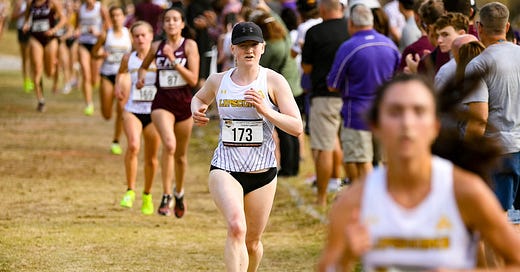




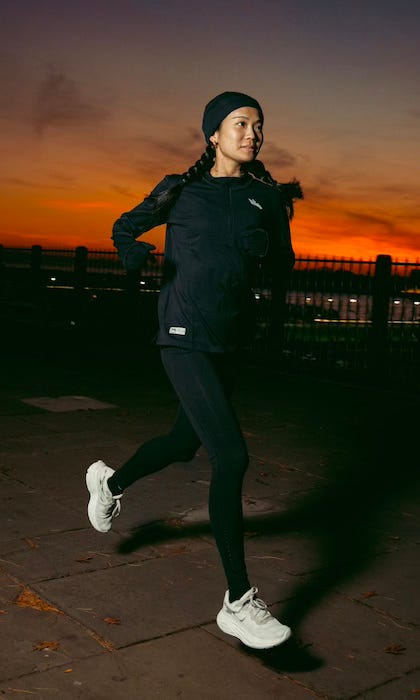
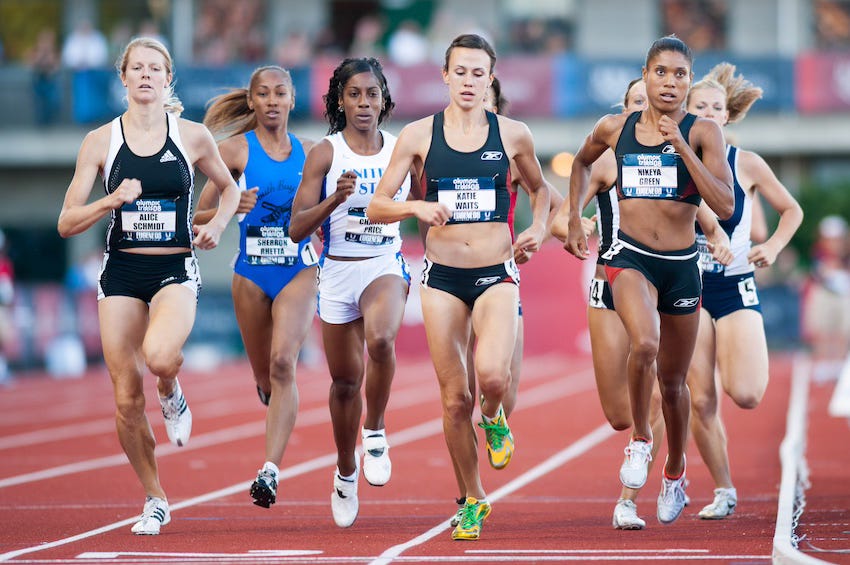





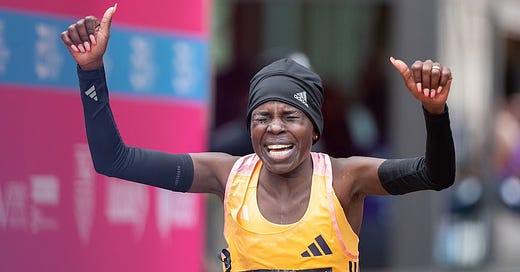

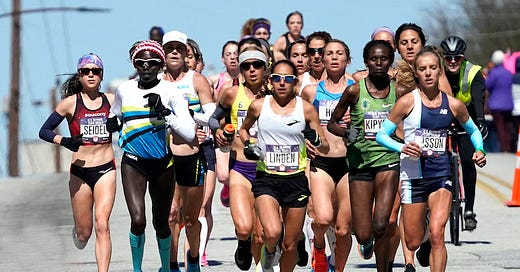

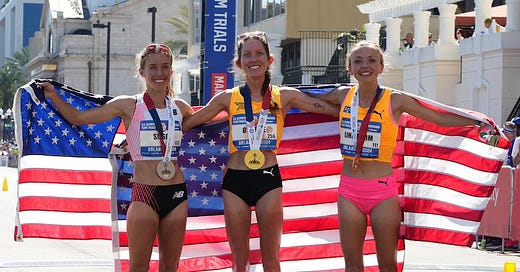

Happy Holidays Alison, and thank you so much for all of the work you put in every year to keep us up to date on women’s running. I look forward to reading every week!